#gretchen mcculloch
Explore tagged Tumblr posts
Text
But there was a period of friction, when “hello” was spreading beyond its summoning origins to become a general-purpose greeting, and not everyone was a fan. I was reminded of this when watching a scene in the BBC television series Call the Midwife, set in the late 1950s and early 1960s, where a younger midwife greets an older one with a cheerful “Hello!” “When I was in training,” sniffs the older character, “we were always taught to say ‘good morning,’ ‘good afternoon,’ or ‘good evening.’ ‘Hello’ would not have been permitted.” To the younger character, “hello” has firmly crossed the line into a phatic greeting. But to the older character, or perhaps more accurately to her instructors as a young nurse, “hello” still retains an impertinent whiff of summoning. Etiquette books as late as the 1940s were still advising against “hello,” but in the mouth of a character from the 1960s, being anti-hello is intended to make her look like a fussbudget, especially playing for an audience of the future who’s forgotten that anyone ever objected to “hello.”
Because Internet, Gretchen McCulloch
13K notes
·
View notes
Text
Every Tumblr user knows that we Tumblrinas use language a little differently. We're not like other social media users. We're weird. We're weirdos. And this month, we have actual linguist Gretchen McCulloch (@allthingslinguistic) on to talk about it!! Plus: House of the Dragon dragon-related feelings and throwing a ball in the air as you lay on your bed like a 90s teen character.
Credits and transcript in our reblog. You can find transcripts for this, and every other episode, here.
Find the posts discussed in this episode in this tag!
311 notes
·
View notes
Note
You, the Mini genus and your tumblr were mentioned in the new Let's Learn Everything podcast episode by Gretchen McCullen! That was really sweet :)
I was so thrilled to hear about this, and then of course went and listened to the episode. Gretchen is just great, and that's a phenomenal episode. I learned a lot! I'm a big fan of the @Lingthusiasm podcast as well, and have been listening for years. Part of my Tolkein and Taxonomy obsession is a love of language and words (see also: my love of puns), and I often say that linguistics would have been my alternate career path, had I somehow not been able to pursue evolutionary biology and herpetology.
#Mini#taxonomy#Lingthusiasm#Let's Learn Everything#podcasts#Gretchen McCulloch#answers by Mark#myceliumromance#fucking ace handle there my friend
120 notes
·
View notes
Text
Rayashki and Zeno: How a harsh environment shapes actions.
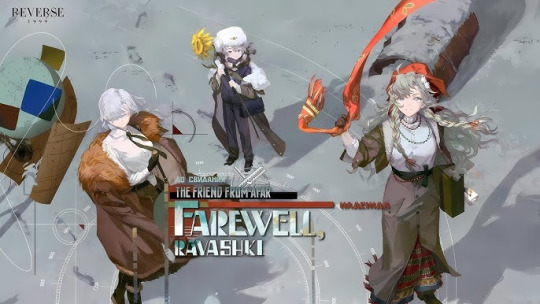
Sometimes, a perception is taken as a principle. A "cruel reality" can be described as a negative perception of the material world, used to assert a situation. "Reality is cruel", however consists in using the previously descrived perception as a fundamental truth or a proposition in which to base the foundations of a system of belief, of behaviour or of a chain of reason. Both are heavily present in Farewell Rayashki, a story all about the strenght of the colective, the indomitable human spirit in the face of adversity and what shapes the actions of those who persue a goal. With that in mind, I wanted to write... Not an analysis per se, but rather to build some sort of structure or perspective (whatever you want to call it) through which the story can be analyzed.
Now, imagine a matrix diagram where the X-axis goes from "Gemeinschaft" (Community) to "Gesellschaft" (Society), two terms taken from german sociologist, Ferdinand Tönnies, and the Y-axis goes from "Deontic" to "Epistemic" in a mix between a Gretchen McCulloch's linguistic sense and a Józef Maria Bocheński's philosophical sense. If everything I just said made no sense, don't worry. Here's a (very) rough explanation of what I'll mean with these two dichotomies through this post: X-axis: A classification of societal ties. "Gemeinschaft" refers to personal, direct interactions with emotional relationships (such as families or small towns like Rayashki) formed by people who strive to archive the goals of a collective. "Gesellschaft", on the other hand, is about indirect and formal interactions, with more rational relationships (like a company or an institution like Zeno) in which everyone band together to persue personal goals in common. Y-axis: A classification of actions as both modality (McCulloh) and authority (Bochenski). Roughly: "actions based on interpretations and beliefs done by someone with an authority based on their ammount of knowledge and experience" (Epistemic)" vs "actions based on rules and/or desires done by someone with a role or position that gives them the power to enforce them" (Deontic).
Upper-left: Gemeinschaft/Epistemic
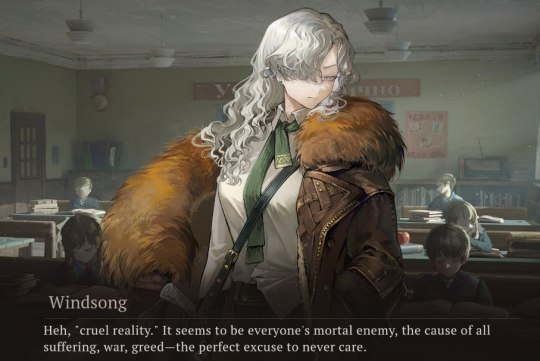
Windsong's quest, mostly percieved as a fool's errand, is a classic underdog story. The lone reasercher who, disheartened by the lack of support from all the important academic institutions and societies, finds in the small town of Rayashki a more hospitable enviroment to persue her goals. She creats emotional conections with the community and soon finds more self-fulfilment in helping the townfolk than in other things like taking Zeno's offer or abandoning her studies, which are presented as more beneficial options from a rational point of view.
She confronts the notion of "cruel reality" and rejects "Reality is Cruel" as a principle. This action comes from what she knows (her study of ley lines) and beliefs (the people of Rayashki, the usefullness of her field of research).
Bottom-Left: Gesellschaft/Epistemic
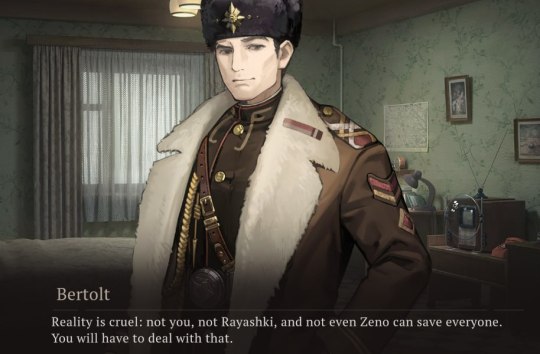
You'll think he should be at the opposite side of Windsong BUT Bertolt, as the classical evil guy in your everyday underdog story, actually rejects the notion of "cruel reality", and accepts "Reality is Cruel" as a principle. His emotional detachment from the people of Rayashki, their values, and even their very same idea of community, comes from his role as a member of Zeno, an institution that exemplfies the impersonal and formal relationships of the Gesellschaft. He doesn't see himself as the evil corporate guy who's there to destroy their dream for a greedy goal, but as the savior who comes to provide the light of rationality to this uncultured rural people who are willing to risk their lives for the sake of primitive traditions and values. He defines himself as a "simple representative of Zeno, bound by their rules and orders, working tirelessly to help people in a world wreaked by The Storm", a description that allows him to minimize his negative perception of the reality of others while justifying operating under the principle of Reality is Cruel.
Bottom-Right: Gesellschaft/Deontic
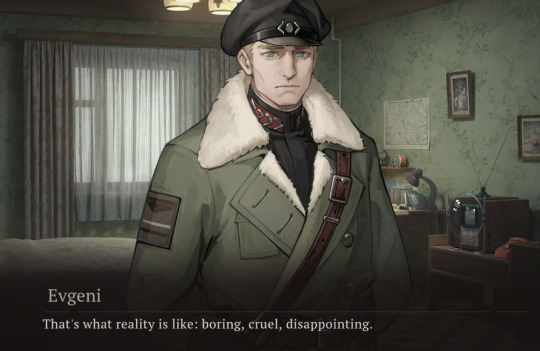
Evgeni is shown through the story as a leader of Rayashki who deeply cares about his community BUT is willing to destroy it for the sake of a rational goal: protecting the lives of the townfolk.
He embraces the notion of "cruel reality", and accepts "Reality is Cruel" as a principle.
But how is HE in the opposite side of Windsong, instead of Bertolt? In Tönnies dichotomy of Gesellschaft and Gemeinschaft, the relationships that are meant to keep people in communities and societies can also push them out: is all about wether the social ties become too tight or too lose to help us find self-fulfilment in them. Windsong found in a community what she couldn't find in society (validation and encouragment for her study of ley lines), while Evgeni thought he found in a society what he couldn't find in his community (a positive prospective for the people of Rayashki).
Upper-Right: Gemeinschaft/Deontic
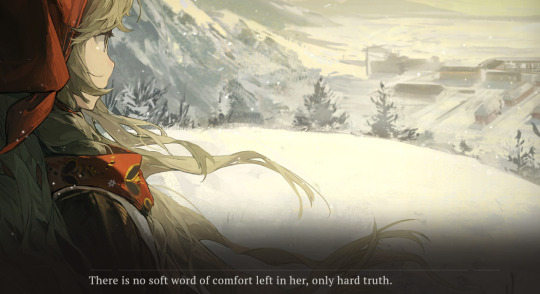
While Bertolt is a man of the world, trying to expand the benefits of globalization by placing the needs of bigger groups above those of the little ones, what Vila is persuing isn't just a goal to archive, but a dream to share. She didn't became a part of Rayashki only to build an utopia: everyone living there were already doing that and Vila found meaning in developing strong emotional ties with everyone as they strive together to work hard for Rayashki.
However, unlike Windsong, she accepts the notion of "cruel reality", even if she doesn't agree with "Reality is Cruel" as a principle. This one si a bit tricky to explain.
It all comes down to their experiences while chasing their dreams and how that shaped their understanding of what a dream is.

For Vila, is something that kept her going. A cherished wish that inspired her to leave the rusalki and search for a new home. A goal she could share with the people of Rayashki. A hope to cling unto while she nourishes the sprouts of Rayashki while they are passengers of the ship called "St Pavlov's Foundation" while adrift in the vast sea of the outside world, so they can carry on the spirit of Rayashki. She accepts the "cruel reality" as something that could hinder her dreams, force her to adapt them, but never crush them.
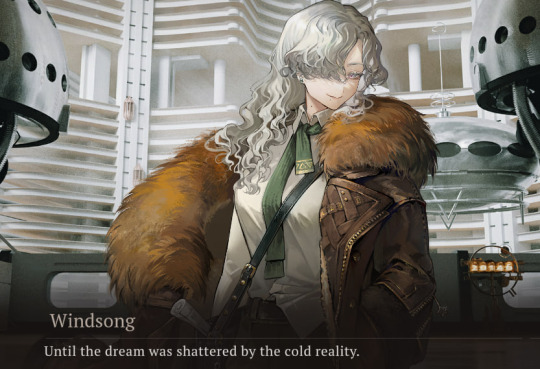
For Windsong, the dream was but a promise turned into a burden. It was not something that comforted her if held tight, but rather something it pained her to let go. Accepting the "cruel reality" meant letting something die, and for someone who was struggling in all fronts, it meant taking a toll way to big for her to handle.
As the last ley line hunter, the dream is but a gamble turned into an investment. The chance of failure is there no matter what. Only thing she can do, is to work hard to reduce it as much as possible. To her, a "cruel reality" is something that crushes dreams. Is not enough to reject the use of this perception as a principle: her own experiences taught her that the perception itself can be a cancer. She might have a tendency to put herself down, to have doubts on what she does and to even be "realistic" in any situation she encounters. But there's ALWAYS a part of her fighting her perception of reality from turning into a negative one even if she lacks the proper arguments or mental state to do it effectively. Vila noticed that from day one, and began to slowly share with her the tools Windsong lacked, helping her become a more confident and capable person, while inadvertibly gaining a trusty partner to rely on.
Their experiences shaped them into people who complement each other incredibly well. Leaning into each other, they'll plant their seeds of hope into a new generation. For the study of ley lines; for Rayashki; for those who live in a world affected by The Storm; for those who'll survive it. *** To anyone who'll read this... whatever the hell it was till the end, thank you for time! Feel free ask me anything, correct me, chew this to bits with your bare teeth, whatever you like. I just haphazardly wrote it because I love this game so much.
#reverse 1999#r1999#bluepoch#vila#windsong#farewell rayashki#gacha#ferdinand tonnies#Józef Maria Bocheński#Gretchen McCulloch#evgeni#bertolt#rusia#reverse: 1999#spoilers#r1999 spoilers#farewell rayashki spoilers#reverse 1999 spoilers#reverse: 1999 spoilers
77 notes
·
View notes
Text
giggling and kicking my feet reading this book??like hi? hello?? dude linguistics has always scratched my brain in such a!!! perfect way!! and ive found the time to read and got my hands on some second hand books and I've been getting through them like fuckkkk,,,,
i wish. i wish. id gotten the opportunity to study linguistics at a uni level. that'd be the dream..
in another life im an academic linguist. unfortunately in this life i like being able to afford food.
ANYWAY huge hype about Because Internet by Gretchen McCulloch. as soon as I finish reading this book I wanna check out her podcast @lingthusiasm
also!!! send me reccs of linguistics books (that are less than a few decades old if possible). as interesting as Pinker's thoughts are, it's kinda funny reading this guy say, in full confidence, that language is so complicated that computers will never be able to believably write anything resembling natural human communication. lol
#im so normal about this#linguistics#fuck it this can go on my yearning blog im yearning for a life where i can study linguistics frfr#love#yearning#lingthusiasm#because internet#gretchen mcculloch#special interest#idk broskis i think i should be paid a million dollars a day for just reading books that facinate me
26 notes
·
View notes
Text
Because Internet

Because Internet: Understanding the New Rules of Language by Gretchen McCulloch
i've been wanting to read this book for ages, and my instinct that i would enjoy it proved totally true. it's a book very much of its moment (it came out in summer 2019) and McCulloch knows and embraces that, and it was actually fascinating to read a few years after the fact because even in that short time, i can already see how internet language and my own informal language have continued to change.
according to the internet speech cohorts outlined in the early chapters of the book, i am a Full Internet Person, maybe a little bit on the cusp of Old Internet Person, and i haven't felt so specifically seen since that article about the Oregon Trail Generation. but everybody's in here, pre-internet, post-internet, you name it, and the book lays out language evolutions over these waves in fun and smart and readable ways. why do boomers use ... at the ends of their texts?? why did emojis catch on?? how do memes evolve??? why do multiple question marks and almost no capitalization feel different than if i wrote this like i was about to turn it in for a grade???? go forth and read to find out!
the deets
how i read it: i read this one as an ebook on Libby, which was deceptive because there were a lot of endnotes and back matter! it was a quick read, for nonfiction, which often goes slower for me.
a line i liked: tag yourself im "kept the same username for decades even"
Those who joined the internet to meet new people kept the same username across platforms for years, decades even, so that their internet friends could find them. But for the internet users who joined in order to hang out with people they already knew, screennames were a way of performing identity, rather than obscuring it: your username might honor a favorite band or movie quote, and could change a few months later as your pop cultural allegiances shifted.
try this if you: think linguistics is cool, are an Internet Person, or want to spend hours thinking about what your top emojis say about your emotional expression (maybe that's just me?)
5 notes
·
View notes
Text

In a chapter on how people choose to use language, based on society and a certain choice that the author adopted.
Gretchen McCulloch, Because Internet (p.48)
2 notes
·
View notes
Text
Yes and:
This is also a generational (Internet-generational) communication difference. Gretchen McCulloch talks in her fantastic and fascinating book Because Internet about the different ways that people communicate in text media, and how those style differences are reflective of how and where they started using (and, I think, but can't remember if she discusses this, how and where they are currently using) online communication tools.
Adding "!!" and emotion-markers like emoticons and emoji is common among a certain generation of internet-users. The fact that it's not universal has got at least as much to do with the users' extra-Internet (i.e. IRL/brickspace) experience and training and their formative online experiences and culture as with individual expression and/or social anxiety.
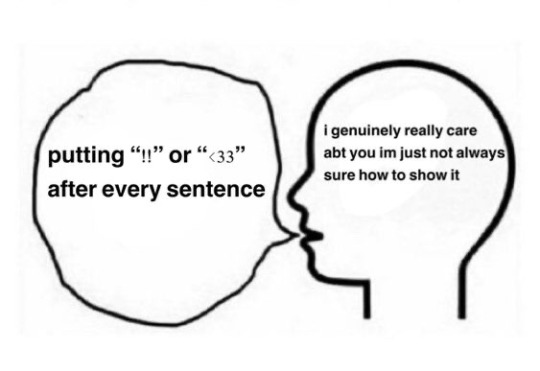
91K notes
·
View notes
Text
The linguist J. K. Chambers did a survey of Canadian twelve-year-olds in the 1970s, and found that two-thirds of them said “zee”—but when he went back and surveyed the same population in the 1990s, he found that the vast majority were now using “zed” as adults. The same shift happened with successive generations. Chambers figured that children learn “zee” from the alphabet song and American children’s television programs like Sesame Street, but when they get older, they learn that “zed” is associated with Canadian identity and switch. Indeed, noted Chambers, “zed” is one of the first things that American immigrants to Canada change about their speech, “because calling it ‘zee’ unfailingly draws comments from the people they are talking to.”
Because Internet, Gretchen McCulloch
15 notes
·
View notes
Text
i cant read books published after 2012 anymore because tell me why this linguistics book im reading just brought up welcome to night vale
#YOURE A NONFICTION BOOK.... YOU SHOULDNT KNOW ABOUT CECIL PALMER....#its my fault though its a book on internet linguistics. by what a specific reference. gretchen mcculloch whats your take on the newest ep.
9 notes
·
View notes
Text
One of my favourite things about linguistics (actually: the thing that got me into linguistics in the first place) is the differences in register between internet generations when texting, I'm so used to Youth People (who I socialise with and am exposed to the content of mostly) getting emotions into text in the standard internet-approved ways that it's like whiplash seeing older people type, my aunt texts like she is being held at gunpoint and yet i know that each message is bursting with beauty and emotion which is not being explicitly expressed
#linguistics#i am paraphrasing “because internet” by gretchen mcculloch#which is a really good book everyone go read it#it has been a while since i read it but i was just thinking about it when i got a really pass ag text
4 notes
·
View notes
Text
Gretchen McCulloch actually talks about the lack of punctuation and capital letters (I think she calls it minimalist punctuation/capitalisation) and other internet language things in her book Because Internet: Understanding the New Rules of language.
Honestly I highly recommend giving it a read if you’re interested – there’s even a chapter on memes if I remember right!
Some internet language things I really like:
Phrases like “that’s certainly a thing”, “it’s so shaped”, or “one of the most animals” (is there a name for this?)
when people write with little to no punctuation like they are just so done
More specifically, asking questions without punctuation i.e. ‘what’ or ‘why’. It’s like, you want to know but also you are resigned to the answer?
When people capitalise The Thing for emphasis - particularly if they add a trademark symbol to really drive The Point™ home
How we use both bold and italic text for emphasis, but they convey it in different ways and I can’t quite explain how
Responding to things exclusively with punctuation, because sometimes words fail you and all you can say is !!!
68K notes
·
View notes
Text
been listening to a (very fascinating) nonfiction book for two days and my brain is clawing for some fun and whimsy
#the nf book is Because Internet by Gretchen McCulloch#and it is really cool to learn about linguistics and the way language changes and specifically how it's changed in the last 30 years#and how the shift in written language in particular is being documented in a way we haven't been able to achieve#like i love it! i do!#lots of things i never really considered but having them pointed out i See It#great time highly recommend!#my brain however needs a good time#so idk what im gonna listen to#ks has a book tag#ks talks
2 notes
·
View notes
Text
the thing is i am acutely aware of how my diction has been dictated by the internet however recognition + self awareness =/= automatic change so maybe i'm stuck like this because i spend and have spent too much time on the internet to really change or reverse it
#i also think the way i talk can be chalked down to autism but that is neither here nor there.#anyways i feel like i always find myself speaking in .... internet phraseology ... and then i cringe because boooo i hate the internet#but idk if i can really change it even if i wanted to!!!!!!#anyways because internet by gretchen mcculloch is a very good book on this topic
8 notes
·
View notes
Text
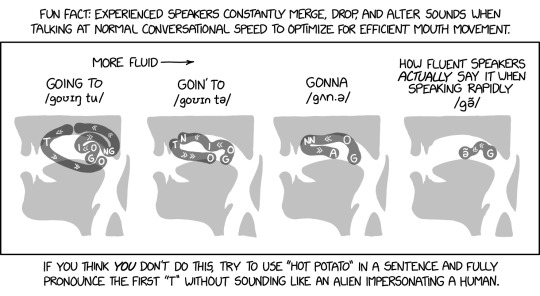
Thank you to linguist Gretchen McCulloch for teaching me about phonetic assimilation, and for teaching me that if you stand around in public reading texts from a linguist and murmuring example phrases to yourself, people will eventually ask if you're okay.
Fluid Speech [Explained]
Transcript
[Above the panel:] Fun fact: Experienced speakers constantly merge, drop, and alter sounds when talking at normal conversational speed to optimize for efficient mouth movement.
[The panel shows four labeled side profiles of a mouth with paths of sounds made in different parts of the mouth. There is a label "More fluid" with an arrow pointing to the right.
From left to right:] [Label:] Going to /ɡoʊɪŋ tu/ [Path:] (G O >> I >> NG >> >> ) ( >> T >> >> O)
[Label:] Goin' to /ɡoʊɪn tə/ [Path:] (G O >> I >> N)(T >> >> O)
[Label:] Gonna /ɡʌn.ə/ [Path:] (G O >> NN >> A)
[Label:] How fluent speakers actually say it when speaking rapidly /ɡə̃/ [Path:] (G >> >> ə̃)
[Below the panel:] If you think you don't do this, try to use "hot potato" in a sentence and fully pronounce the first "t" without sounding like an alien impersonating a human.
#xkcd#xkcd 2942#fluid speech#webcomics#linguistics#can you tell i've been having trouble getting back up on this pony
4K notes
·
View notes
Text
One thing that changes with the decentralization of online media is that the original speakers can become more visible. While a white person in the sixties listening to Elvis might have had no idea that he was singing a style heavily influenced by black performers like B.B. King and Sister Rosetta Tharpe, it’s easier to see that mainstream America’s adoption of “on fleek” came from a post on Vine (a now defunct service for sharing short videos) by the user Peaches Monroee. Still, it’s tempting to mislabel the many words currently being appropriated into general American pop culture from African American English as “social media words” simply because they’re used by young people, and young people are on social media, without giving due credit to the words’ true origins. Fittingly, the internet has come up with a word for this: columbusing, or white people claiming to discover something that was already well established in another community, by analogy with how Columbus gets credit for discovering America despite the millions of people who already lived there.
Because Internet, Gretchen McCulloch
6 notes
·
View notes